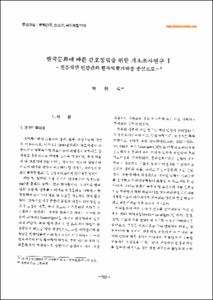한국문화에 따른 간호정립을 위한 기초조사 연구 1-전통적인 인간관과 환자역할 기대를 중심으로
- Keimyung Author(s)
- Park, Jeong Sook
- Department
- Dept. of Nursing (간호학)
- Journal Title
- 대한간호학회지
- Issued Date
- 1996
- Volume
- 26
- Issue
- 4
- Abstract
- This study was a survey done for the purpose of constructing a nursing theory according to Korean culture and to identify the traditional Korean view of humans and the expectations of the sick role, and to confirm changes from the traditional view of humans and expectations of the sick role according to general characteristics of the population.
The subjects were all adults over 18 years old. 517 who lived in six large cities and 191 who lived in five rural communities. Data collection was done from November 19th, 1994 to January 19th, 1995 using a tool to measure the traditional view of humans and expectations of the sick role which was developed by the investigator through a literature review.
Collected data were analyzed using frequency, percent, Cronbach alpha, I —test, F —test and Scheffe post hoc contrasts, with the SAS program.
Thr results of this study are summerized as follows ;
1. The Traditional view of human score for all sub¬ject was 49.92, which shows that Korean tra¬ditional view of human is moderate. High scored items were "human need to live by making har¬mony with nature, not by overcoming the nature" (3.44), "Filial duty to parents and elders is
•Keimyung University College of Nursing. Tel : 053) 250 - 7800, Fax : 053) 252 - 6614 E-mail : kckwon@nanum-kaeri-re-kr
important"(3.31), "Think of family more than a individual"(2.96).
2. The differences in the traditional view of humans between residential districts showed that the residents of Chungbuk(56.00), Kyungbuk(55.26), Chonbuk(51.32), Taegu(50.59) had a more tra¬ditional view of humans than those in Pusan(45. 42) and Seoul(47.27).
3. The differences in the traditional view of humans according to general characteristics showed that rural community residents, males, older people, people with lower levels of education, married and house—resident groups had a significantly higher traditional view of humans than urban residents, females, younger people, people with a higher levels of education, single and apartment-resi¬dent groups. There were differences according to religion and job. Buddhism had a higher tra¬ditional view of humans than those of atheism, Christianity and Catholicism and physical workers, a significantly highers score, than technicians and professional workers.
4. Daily expected task performance during illnesses was lowest for patients with stroke(2.16) and psy-chosis^.40), in which ease almost no daily gen¬eral tasks were expected, followed by arthritis 4. 06, peptic ulcer 4.79, headache 4.99 and cough 5. 58. The amount of expected role exemption during illnesses was also highest for stroke(2.25), fol¬lowed by psychosis(2.08), arthritis(1.64), peptic ulcer(1.29), headache(1.16) and cough(1.09). The amount of daily task performance in the acute stage(3.05) was significantly lower than that of convalescent stage (4.95).
5. Total expectation of role exemption according to general characteristics showed that there was no significant differences in urban / rural community, marriage, level of education and religion. By sex, women showed higher expectation of role exemp¬tion during illnesses than men. By age, the 31-40 year old group showed lower expectation of role exemption than the 41-50 year old group or over the 61 year old group.
- Alternative Title
- A Survey for the Construction of Nursing Theory According to Korean Culture
- Traditional View of Human and Expectation of Sick Role -
- Keimyung Author(s)(Kor)
- 박정숙
- Publisher
- College of Nursing
- Citation
- 박정숙. (1996). 한국문화에 따른 간호정립을 위한 기초조사 연구 1-전통적인 인간관과 환자역할 기대를 중심으로. 대한간호학회지, 26(4), 782–798.
- Type
- Article
- ISSN
- 2005-3673
- Appears in Collections:
- 2. College of Nursing (간호대학) > Dept. of Nursing (간호학)
- 파일 목록
-
-
Download
 oak-bbb-00075.pdf
기타 데이터 / 1.12 MB / Adobe PDF
oak-bbb-00075.pdf
기타 데이터 / 1.12 MB / Adobe PDF
-
Items in Repository are protected by copyright, with all rights reserved, unless otherwise indicated.